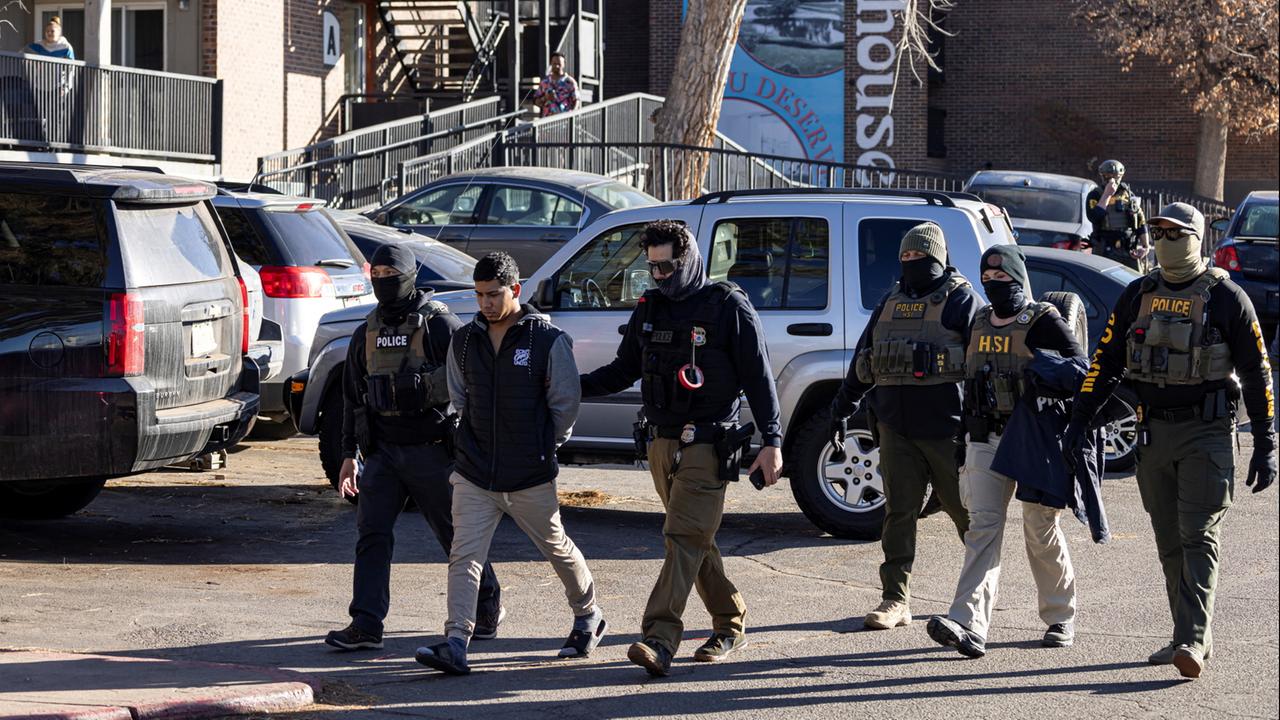The partly brutal deportations have changed the lives of many migrants in the United States. This can also be felt in cities that stand for a welcome culture. There you always meet a deeply seated fear.
The classroom is well filled. In English lessons in the Immigration and Refugee Center for North Colorado (IRCNOCO) in the city of Evans, adult students sit, including from Peru, Mexico, Nicaragua.
The director of the Immigration Center, Araceli Calderon, says that since US President Donald Trump took office, more people would come here to visit English or Integration courses. They hoped to increase their chances of citizenship or a right to stay.
Similar numbers, different procedures
According to the Trump government, more than 33,000 immigrants have been arrested by March. So far, this is not a clear increase compared to the first months of the term of office of Trump's predecessors Joe Biden or Barack Obama. But Trump shocked many primarily through his rigorous approach: by arresting students who protested against Israel, for example, or by deportation fees from more than 200 alleged gang members to El Salvador.
Mitzi Moran heads the Health Center Sunrise, which works with Ircnoco. Moran explains that the deportation fees in particular also triggered great fear and uncertainty among migrants with the right to stay or those who had citizenship: “Are you asking themselves: am I next to it? Because of my name, because of my skin color or because I have a tattoo?”
The immigration center recently increased the safety precautions. The rhetoric in connection with immigrants and refugees is so heated. “We are concerned that people who are against immigrants could appear here and do something that we don't want here,” reports Moran.
In February, ICE officials carried out raids in Denver. This man was also removed.
The legal process is also associated with fears
Hans Meyer in Denver about an hour away has to do with concerned immigrants every day. Meyer is a lawyer for immigration law. Since Trump has been in power, the 51-year-old says, more people came to him who were looking for advice. But a few decided to take legal action out of fear of drawing attention and thus being targeted by the government.
Meyer speaks of the darkest times he has experienced so far. “I think we will experience that political opponents are being targeted. Critics of the Trump government. Lawyers like me and others who are committed to immigrants. We too will become a target,” predicts Meyer.
What the constitution provides
The lawyer also says that of course not everyone in Denver is enthusiastic about the increased number of migrants. In 2023 and 2024, more than 40,000 new immigrants came to the city with its approximately 720,000 inhabitants under the then President. Emergency accommodations have been set up, Denver also came to the border financially.
The city and the state of Colorado are ruled by the Democrats, are considered immigration -friendly. Denvers Mayor had to justify himself a few weeks ago with other democratic mayors in a congress committee. Trump threatens to delete states like Colorado.
He knows some who are not exactly migrant friends, says Meyer. And of course that is a legitimate position. “But we have to adhere to our constitutional democracy. That means people have the right to process.”
Immersey to avoid deportation
Meyer assumes that many immigrants will also try to go into the public in Denver. This became clear a few weeks ago when there was a large-scale raid by the US Border Protection Authority ICE. People were afraid to get to work. The students stayed away in schools.
You could also observe that at the Ashley primary school on the eastern outskirts of Denver. 70 percent of the approximately 400 students are migrants, most of them have immigrated to their families in the past two years. How many are without papers? The director Janet Estada says that she does not know, but estimates that it was the vast majority.
Activists have created a leaflet in Denver to call on to report activities by the ICE activities – in order to be able to warn migrants of raids at an early stage.
Fear is omnipresent
With horror, Estada thinks back to a day in mid -February. There were raids, also in a residential area of their students. The ICE did not let the students go into the school buses, said the director.
That day she felt so hopeless. She walked through the school, in classrooms with otherwise 25 to 33 students just sitting seven to ten children.
In the meantime, the director says, the number of students is back on the normal status, but the fear is omnipresent. “The children talk about their fear,” says Estada. Above all, because some students have already deported father or mother. The children are silent, in themselves. Psychologists supported the school.
With other schools, Estada tried to keep employees of the ICE from school premises away from a lawsuit. A judge dismissed the lawsuit. The school director says: “I would have to let her in with search command, we won't let her in without a search order.”
In Aurora in the US state of Colorado, citizens demonstrate for Jeanette Vizguerra, a known migrant woman who was detained by the ICE authority.
The reaction: solidarity
They are experiences like this who triggered a wave of solidarity in Denver. Raquel Lane-Arellano is the spokeswoman for the civil rights organization coalition for the rights of migrants in Colorado. She says she finds the situation extremely scary. But she is proud of Denver and his people.
This time it is somewhat different from Trump's first term. This time the community is prepared differently. Lane-Arellano says: “There is so much energy from so many people who want to stand for each other. It's really beautiful.”





